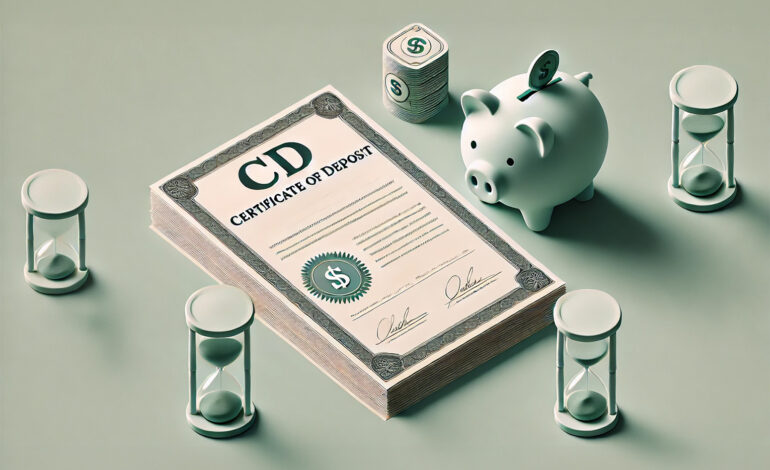
Are CDs a Good Investment?
When considering low-risk ways to grow your money, you’ve probably come across certificates of deposit, often referred to as CDs. They’ve long been a favorite for conservative investors looking for guaranteed returns without exposure to market volatility. But how do they stack up in today’s financial environment? Let’s take a closer look at whether CDs still hold up as a smart investment option.
What Is a CD?
A CD is a time-based deposit product offered by most banks and credit unions. When you open one, you agree to keep your money locked in the account for a specific period—usually ranging from a few months to several years. In exchange, the bank pays you interest on the deposit.
Unlike regular savings accounts, the interest rate on a CD is fixed, and you generally can’t access the money until the term ends without facing penalties. This makes them different from more liquid financial tools, but that limitation comes with its own advantages.
How a Certificate of Deposit Account Works
Here’s a simple breakdown of how this type of savings product functions:
- You choose a term length that suits your savings goals.
- You deposit a fixed amount of money.
- The bank pays you interest throughout the term.
- When the term ends (also known as maturity), you receive your initial deposit plus the earned interest.
Because of this structure, a certificate of deposit account is often viewed as a “set it and forget it” type of investment. You don’t have to actively manage it, which can appeal to individuals who prefer simplicity and predictability.
The Benefits of Investing in CDs
Guaranteed Returns
One of the most attractive features of a CD is the guaranteed return. Unlike stocks or mutual funds, CDs aren’t influenced by market changes. The interest rate is locked in, so you know exactly how much money you’ll earn by the time the CD matures.
Minimal Risk
CDs are considered among the safest investment options. Most are insured up to the allowable limits by the FDIC (for banks) or the NCUA (for credit unions), which protects your deposit even if the institution fails.
Easy to Understand
There are no complicated rules or market jargon involved. You put money in, leave it there for a set period, and receive interest. It’s an ideal option for beginners or those who want a low-maintenance investment.
Higher Rates Than Traditional Savings Accounts
While the interest rates on CDs may not compete with riskier investments, they are generally higher than those offered on basic savings accounts. The longer the term, the better the rate in most cases.
The Downsides to Consider
Limited Access to Funds
When you commit to a CD, you’re agreeing not to touch that money until the term ends. If you withdraw early, you’ll likely face penalties that can eat into your interest or even reduce your principal.
Inflation Risk
If inflation rises significantly during your term, the purchasing power of your interest earnings may be lower by the time you withdraw. In other words, your money might not stretch as far in the future as it does now.
Opportunity Cost
By locking in a fixed rate, you could miss out on higher returns from other investments. For example, if the market performs well or interest rates rise significantly, your CD might underperform compared to alternatives like bonds or high-yield savings accounts.
When CDs Make the Most Sense
CDs can be a smart choice in a variety of financial situations. Here are a few scenarios where they shine:
You’re Saving for a Specific Date
If you know you’ll need the money at a particular time—say, for a home down payment in two years—a CD that matures around that time can be a perfect fit.
You’re Risk-Averse
Not everyone is comfortable with the fluctuations of the stock market. If you prefer peace of mind and want to avoid losing your principal, a certificate of deposit account offers that security.
You Have Emergency Savings Elsewhere
Because CDs limit access to your money, they shouldn’t be your only savings tool. If you already have an emergency fund in a more liquid account, using CDs for long-term savings can help you earn more without taking on risk.
Comparing CDs to Other Low-Risk Investments
To get a clearer picture, it’s helpful to weigh CDs against some common low-risk alternatives.
Savings Accounts
- Pros: High liquidity, easy access to funds.
- Cons: Very low interest rates.
- Best For: Emergency funds and short-term savings.
Money Market Accounts
- Pros: Often higher rates than savings accounts, limited check-writing ability.
- Cons: May require higher minimum balances.
- Best For: Short-term savings with occasional access.
Treasury Bonds
- Pros: Government-backed, longer terms, higher potential returns.
- Cons: Requires more knowledge to manage, interest is subject to market conditions.
- Best For: Long-term savers who are okay with less liquidity.
CDs sit in the middle of these options, offering higher returns than savings accounts and more predictability than bonds.
Understanding Laddering as a CD Strategy
One way to take advantage of CDs while maintaining some liquidity is a strategy called laddering. This involves opening multiple CDs with staggered maturity dates. For example:
- A 1-year CD
- A 2-year CD
- A 3-year CD
When the first CD matures, you can reinvest that money into a new 3-year CD, continuing the cycle. This approach helps spread risk and provides more flexibility in case interest rates rise.
What to Look for When Opening a CD
Before committing to a certificate of deposit account, consider the following:
- Interest rate: Compare rates from different institutions to find the best offer.
- Term length: Choose a term that matches your goals so you don’t need to withdraw early.
- Minimum deposit: Some CDs require a higher initial investment than others.
- Early withdrawal penalties: Know the costs if you need to access funds early.
- Renewal terms: Understand what happens at maturity—some institutions automatically renew unless you request otherwise.
Final Thoughts
So, are CDs a good investment? That depends on your financial goals, risk tolerance, and timeline. For those who prioritize security, predictable returns, and minimal management, a certificate of deposit account can be a reliable way to build savings. It may not provide the excitement or high returns of stocks, but it serves a valuable purpose in a diversified financial strategy.
If you’re looking for a safe place to park your money, earn interest, and reach specific savings goals without market volatility, a certificate of deposit account is worth considering. Just make sure to compare options and align the term with your future needs. Like any investment, the best results come from making choices that suit your unique financial situation.



